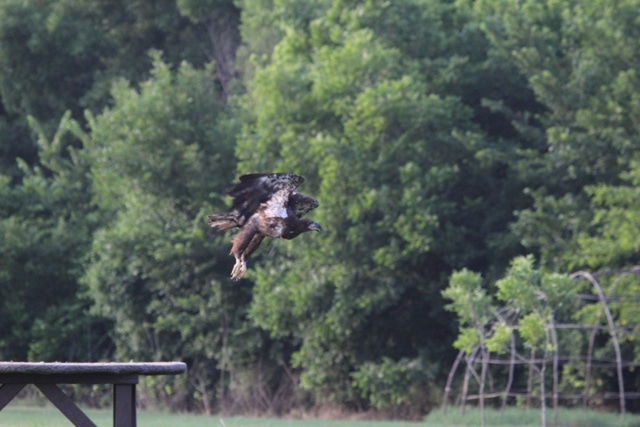We have become accustomed to Wadase Zhabwe’s presence here on the aviary grounds. She has spent the majority of her time here or nearby since her return to the aviary on May 10th.
We seem to have reached an arrangement that works for her. As long as she greets us for breakfast we work around wherever it is that she decides to hang out during the day and keep the property quiet and peaceful. She continues to amaze us as we learn so much from her as we watch her progress in her abilities as a hunter. There are days that she may skip breakfast, the GPS tells us she may be hunting on her own since she is making regular trips to the river nearby, but she always knows that she can come home for a free meal.
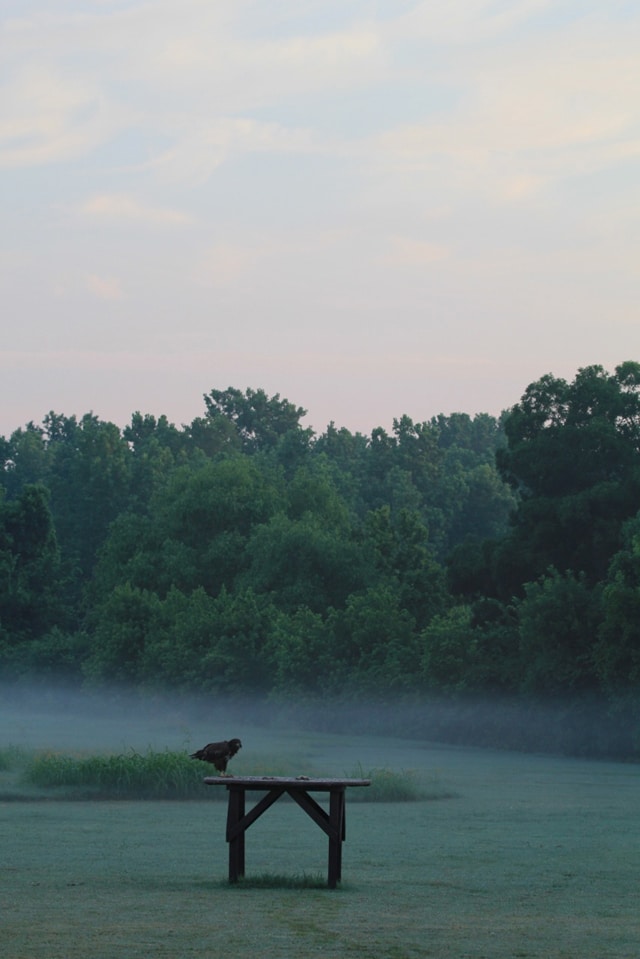
There have been times we have been able to observe her play. As she sits, perched atop the wigwam she would fly down to pounce on small sticks in the grass, mock killing them and carrying them back to the top of the wigwam and repeat the process over and over. This is a good sign that she is developing the necessary skills to hunt and as we see her catch live prey it is clear that she has put play into practice. We have seen her with everything from squirrel, turtle, and opossum. The turtle was a puzzle that took her quite a while to figure out but after several attempts of tossing and pouncing much like the stick she had played with so many times before, she was successful.
There are times in the early morning when she flies in for breakfast that she opts to pass over the platform where we feed her and lands on the top of the aviary. She is always greeted with a round of calls from the eagles she once shared a home with and most likely thinks of them as her parents. She is learning that there is no ceiling or limit to her flight as she continues to gain strength and skills and she looks inside the enclosures, curious why they don’t follow her out as she flies away.
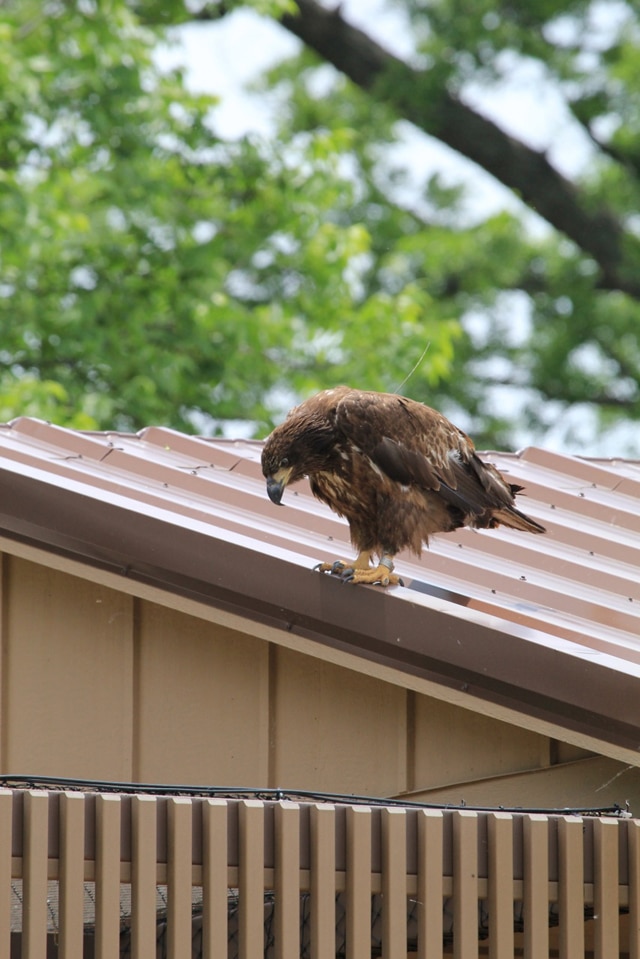
Our day depends largely on hers. We try to give her the space she needs to feel comfortable and try not to disrupt her. She runs the show. We try to mow and complete the yard work during the times when she isn’t right near the aviary. We have even had tour groups come in the back door rather than disrupt her and make her leave her favorite perch. The PLP students were one of the fortunate groups that had the opportunity to view her sitting right outside the front door of the aviary enclosures. We are hopeful that she will continue to frequent the property as she continues to mature.
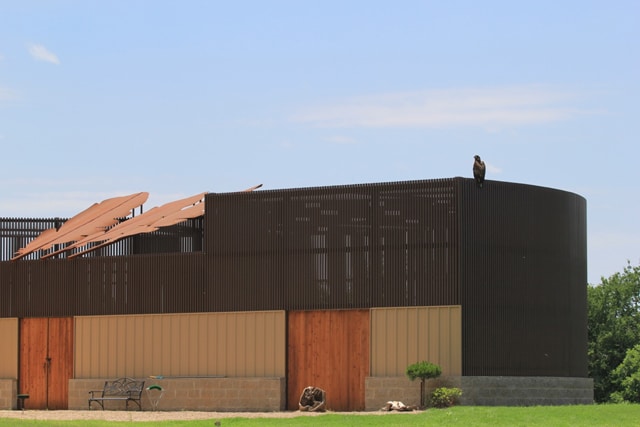
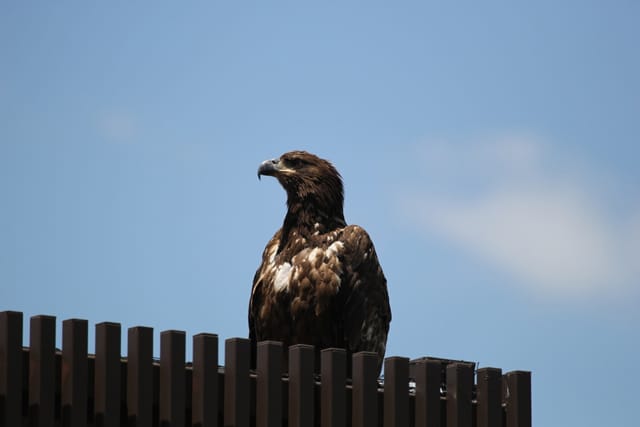
This has been an incredible season; spring in Oklahoma was tumultuous to say the least. We were fortunate to have only minor wind damage here at the Aviary grounds. However, with those storms came tremendous rains and hard winds. On one of those nights we awoke to large limbs down and no sign of her anywhere. We knew where she was perched at dark and were concerned for her safety when we could not locate her.
Searching the property with the latest GPS, we found her soaked and disoriented out in the front pasture. She actually looked relieved to see us. She was on the ground, feet covered in mud and we feared she could be hurt from being blown out of the tree or from spending the night on the ground where she could have been vulnerable to predators. She came closer for food we placed near the edge of the pasture, but did not fly. She spent hours sitting on the gatepost as she hung her wings down and open to dry out.
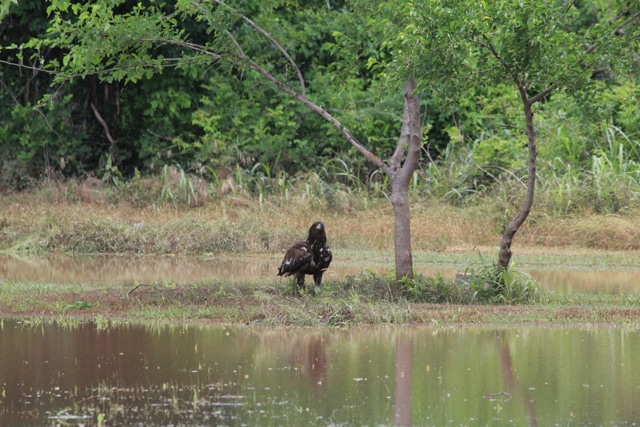
We waited. After several hours past and she was no longer water logged she flew to her wigwam and called loudly, as if she was announcing that she had once again lived up to her new name and had survived another great battle. Although, those rains all across the state were going to cause the river to flood and as we secured things around the property we worried for her safety and wondered what she might think and if this might make her leave the area.
Once the river began to creep out of its banks, the property started to flood; with night coming we could only wait. The next morning we awoke to more than 2/3rds of the property under water and she returned to her platform for breakfast. Once she finished eating she went back to her wigwam, which was now surrounded by water. She would make short flights and return to the platform or the wigwam or what little yard wasn’t under water. She seemed as nervous as we were.
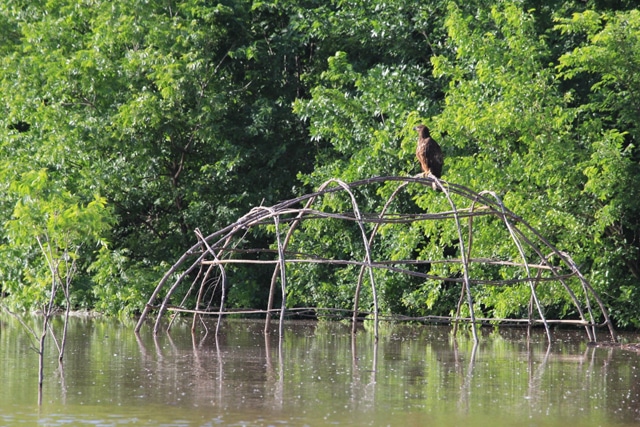
Eventually the Aviary itself was an island; we had turtles, snakes, spiders and bugs of all kind searching for the safety of higher ground. The rising water even trapped one raccoon, which paced around the enclosures, too afraid to swim to a nearby tree. She finally settled for the evening once again on her wigwam and as long as it didn’t float away she was safe. The following morning we were happy to know the river had crested and eventually the water would recede, and she was safe atop the wigwam.
We were glad to see spring go and summer arrive, even if it meant hotter weather. We were ready for drier weather and hopefully less severe storms. Our routine continued much the same as we began to prepare for the CPN Heritage Festival.
Most of the time Wadase would hang around until the sun was fully on her wigwam and she would go further down the creek to seek a cooler shaded perch, we hoped that she would stay for the morning tours of the aviary.
Without a disruption in our routine two weeks before festival she was gone. Days past and when the GPS was in we learned she was back at the Iron Horse Bridge on the river. Had she learned to fish with the floodwaters gone and the river back to normal? Would she be back? We couldn’t be sure.
Our attempts to spot her along the river were not successful. One morning seven days after her departure, there she was, as if nothing had ever changed. She was waiting on breakfast. Once tours began during the festival, many tribal members had the opportunity to see her perched atop her wigwam. Many of those tribal members were excited to see her since they had been the previous year when we had little hopes of her being releasable.
What an incredible year it has been. We could not have imagined having the opportunity to release an eagle so soon. We will continue to monitor her progress here as long as she allows us. Winter will bring eagles into the state as they look for unfrozen lakes and streams to fish and when spring comes back we do not know if she will stay or if the urge to migrate arises we may see her leave with the birds who wintered here. We can only hope that she might stay and find a mate here in the future. Only time will tell.
